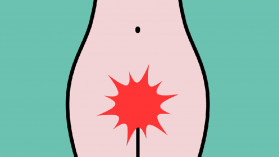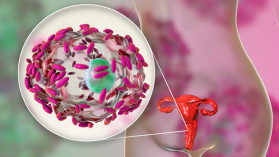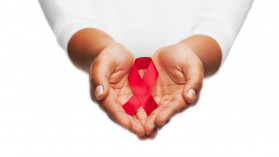Get Informed Topics Safer Sex & STIs Types of STIs HIV/AIDS
HIV/AIDS
What is HIV/AIDS?
- HIV stands for Human Immunodeficiency Virus, a virus that affects the body’s immune system. When the immune system is weakened, the body has less ability to fight off infections. The term “HIV-positive” refers to someone who has HIV.
- HIV is the virus that can lead to AIDS (Acquired Immune Deficiency Syndrome). An HIV-positive person is diagnosed with AIDS when they become ill from certain types of infections (called opportunistic infections) or cancers.
- The amount of time it takes for HIV to progress to an AIDS diagnosis depends on many factors, including financial resources, level of support, and access to healthcare. Someone with HIV can live a long time before being diagnosed with AIDS.
How do you get HIV?
- Anyone can get HIV, regardless of age, gender, race, class or sexual orientation. HIV exists in every country in the world.
- HIV is found in certain bodily fluids of someone who has HIV: semen (cum), vaginal fluid, anal fluid, blood and breastmilk.Contact with any of these fluids can put you at risk of getting syphilis.
- You can get HIV if you have unprotected oral, vaginal or anal sex with someone who is HIV positive or if you share needles with someone who is HIV positive.
- You can get HIV if you are sharing sex toys with an HIV positive person and you don’t disinfect the toys or put a new condom on them each time a new person uses the toy.
- An HIV-positive pregnant person may pass the virus to their baby during delivery or through nursing if they don’t have access to or don’t take medications that can prevent this.
- You can get HIV from any unsterilized tools used during activities that cut the skin such as tattooing or piercing.
- You cannot get HIV from mosquitoes or from kissing, hugging, touching, sharing towels or toilet seats.
- You cannot get HIV from touching, kissing, sharing towels, sitting on the toilet or masturbating.
How do you know if you have HIV?
- The only way to find out is to get tested. HIV does not cause symptoms in most people and can still be passed on even when there are no symptoms.
- About a week after getting the virus, some people may experience flu-like symptoms (fever, aches, sore throat, etc.) and/or a body rash that usually go away within 1-2 weeks.
How and where can you get tested for HIV?
- You can get tested for HIV in most public or private health facilities in your area. Find an HIV test site near you by using the clinic finder here (Link)
- If you get a test in a health care setting or a lab, a health care provider or lab technician will take your sample (blood or oral fluid).
- An HIV test is a blood test that looks for antibodies, a substance that the body produces in response to the HIV virus.
- The time between your possible exposure to HIV (eg. unprotected sexual activity) and when you can get an accurate test result is called a “window period.” Most people who have been exposed to HIV will develop enough antibodies for an accurate test result about 4-5 weeks after the exposure.
- However, because some people may take up to 3 months after possible exposure to produce enough antibodies for an accurate result, the window period for an HIV test is 3 months. This means that if you get a negative test result before the 3 month window period has passed, you may be asked to return for re-testing.
- You can also test for HIV at the comfort of your home or private location using the HIV self-test kit.
Self testing Video https://drive.google.com/file/d/1ZCgx0BraouDDTPj72g_oqiSolIcpm__Z/view?usp=sharing
What if you test negative for HIV?
- If your HIV test result is negative, it means you did not have HIV antibodies at the time of the test.
- However, if you were tested before the 3 month window period has passed, you may be asked to come back and be re-tested.
What if you test positive for HIV?
- If your HIV test result is positive, it means you have HIV.
- A positive result does not mean that you have AIDS. It does not tell you when you got it or if you will develop AIDS. It means that you can carry the virus in your blood, breastmilk, anal fluid, semen or vaginal fluids and can pass it to others through unprotected sex or sharing needles. Pregnant people can pass the virus on to their fetus during pregnancy or their baby while nursing.
- Being HIV positive isn’t the end of your sex or love life. There is a lot of sexual health/relationship support for HIV-positive people.
- It is important that you tell any recent sexual partners (in the last six months) that you are being treated for HIV, so that they go for treatment too.
- Some clinics may also offer to contact your partner using what’s called a ‘contact slip’. This is to inform them they may have been exposed and to recommend they get tested but it doesn’t mention your name.
How is HIV treated?
- There is currently no cure for HIV, but a variety of treatments are available to fight the spread of the Virus
- Antiretroviral therapy (ART) is the recommended treatment for HIV infection. Find out more about HIV treatment here(Link to HIV treatment page)
How can you lower your risk of getting HIV and/or passing it on to your partner(s)?
- Make informed decisions. Talk to your partner(s) about STIs and the use of safer sex tools such as using condoms, dams and testing
- Use condoms on penises or dildos for vaginal or anal sex, use latex gloves for finger play and fisting, and use condoms/dams for oral sex to lower your chances of getting or transmitting HIV.
- If you are HIV-positive, talk to your clinician about taking medications that can reduce the risk of transmission.
Partner Notification
- If you are diagnosed with HIV, it is important that you or someone from the public health department notify your past sexual partners so they can be tested and treated. Your name is not disclosed when a sexual partner is contacted.
Frequently Asked Questions
Male Body
1 questions
See frequently asked questions on Male Body
Let's Talk
Facts, tips, stories and common questions
Go to Forum




